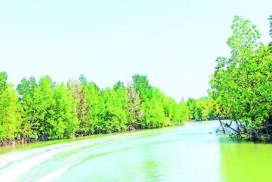Myanmar, a land blessed with abundant natural forests, has a rich history tainted by aggressive colonial exploitation of its timber resources. The consequences of this historical deforestation are now evident on a global scale as the Earth grapples with escalating temperatures and the adverse effects of environmental degradation. The undeniable truth is that deforestation has ushered in a host of natural calamities, including droughts, floods, storms, landslides, and earthquakes, impacting human lives worldwide.
It is essential to recognize that climate change is not solely a result of timber extraction but rather the manner in which it is conducted. To address this pressing issue, authorities must implement a sustainable approach to timber extraction, adhering to predefined limits, while simultaneously embarking on reforestation efforts encompassing diverse tree species. This strategy aims to enhance the socioeconomic well-being of the population while preserving the natural environment and ecosystem.
Today, the world grapples with dwindling groundwater reserves, river and creek silting, and recurring droughts. Consequently, all living beings endure hardships as a result of water scarcity in its various forms. This compels all Myanmar citizens to embrace the responsible management of forest resources, environmental greenery, climate change mitigation, and natural disaster prevention.
In this collective endeavour, rural communities must take on the responsibility of conserving trees and forests, while urban dwellers have a national duty to green their surroundings. This commitment is integral to improving climate conditions, raising living standards, and advancing economic, social, and health sectors.
The renewability of natural resources varies, with some resources replenishing automatically and others requiring human intervention. Forests fall into the former category, offering the opportunity for human assistance in the regeneration process. Thus, it becomes imperative for humanity to embark on the correct path of reestablishing forests, lest the entire world faces dire consequences of environmental degradation.
Since Myanmar gained independence in 1948, successive governments have heavily relied on timber exports to bolster state revenues. Unfortunately, this approach led to a drastic decline in the nation’s forest cover, plummeting to a mere 42 per cent of the national territory. The onus now falls on every citizen to partake in reforestation efforts, incrementally increasing forest cover to mitigate the impacts of climate change and natural disasters.
Today, the world grapples with dwindling groundwater reserves, river and creek silting, and recurring droughts. Consequently, all living beings endure hardships as a result of water scarcity in its various forms. This compels all Myanmar citizens to embrace the responsible management of forest resources, environmental greenery, climate change mitigation, and natural disaster prevention.
In light of these pressing concerns, tree-planting ceremonies have become a ubiquitous tradition across the nation during the monsoon season when the soil is primed for sapling growth. These ceremonies symbolize acts of compassion and nobility, reaffirming our commitment to a greener and more sustainable future for all.














